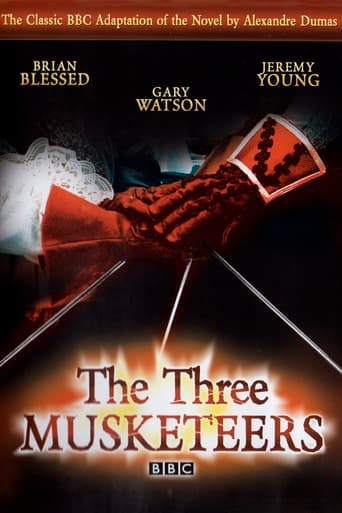

A full half-hour longer than Richard Lester's Three Musketeers and Four Musketeers combined, this mini-series sticks much closer to the original text. After reading the books by Dumas I realized what was missing with the Lester films, namely characterization, dialog, and plot. This BBC Television version was shown as 10 episodes, and features a well-balanced cast including Brian Blessed and Jeremy Brett. My only complaint is that each episode features the same opening and closing credits as seen on TV. This means sitting (or fast-forwarding) through ten sets of credits. If I can re-sequence the episodes to exclude the credits then I'll have the best film version to date.
... View MoreI have fond memories of this series when I was a child, and thought Jeremy Brett was gorgeous. Seeing it again as an adult, I was surprised at how good it still is.Some of the acting is rather hammy, particularly Anne of Austria and Constance Bonacieux, the fights seem pedestrian and some of the lighting is poor. However, given the time it was made, it is a faithful adaptation and it is unfair to compare it to modern dramas. The musketeers are all fine, and Brett is still gorgeous. Most impressive though to me is a very convincing portrayal of the melancholy and woman-hating Athos by Jeremy Young, whose performance stands out among the four friends. I recommend it as more closely following the novel than the later films. Just a shame it's in black and white.
... View MoreA nice change to see a series which keeps to the book, preserving the dark and sombre tone of the overall story as well as the comedy of the opening chapters. Given that this is a BBC series dating from the mid-sixties the quality (B & W) is surprisingly good, certainly comparable to the early Dr Who's, though the camera clearly had difficulty with the lighting in some of the outside scenes (and this is very early in the history of British TV drama to have any scenes at all shot in the open air). The fight scenes seem pedestrian until one realises that there are no special effects and the actors are performing all the action in person (no stunt men) and live (no cutting and editing; each scene had to be shot as a whole, as if on a theatre stage). D'Artagnan is fiery and emotional, 'the typical Gascon' that Dumas describes; the three musketeers themselves are exactly as I have always imagined them to be - the ascetic Aramis, the extrovert Porthos (a very young Brian Blessed) and the immensely tragic Athos; Milady is evil incarnate; and Richelieu is power-hungry, manipulative and supremely ambivalent. If you want a faithful adaptation with excellent acting and the focus on the characters then this is the one for you; if you're more interested in good visuals and special effects, CGI and Errol Flynn-type fight scenes, give it a miss.
... View MoreThis 1966 BBC production is a fairly conventional adaptation of the classic Alexandre Dumas story. Content-wise, it is comparable to the better-known 1948 and 1973 versions. Whereas those films have comedic elements, this one lacks any significant humor.On its own merits, it appears to have enjoyed a respectable budget and fairly good production values. The casting of Brian Blessed as Porthos is particularly welcome. However, the performances are stiff, the fights and swordplay uninspired and unrealistic, the music and cinematography mediocre to poor. Portions of the portrayal of D'Artagnan are grating, particularly in Episode One. There is an over-reliance on dialogue, giving the film the tone of a plodding soap opera rather than a rousing adventure. When compared to the 1948 and 1973 adaptations, its weaknesses become particularly glaring. Nevertheless, dedicated fans of the Musketeers genre should probably give it a chance.
... View More